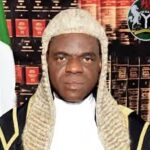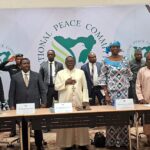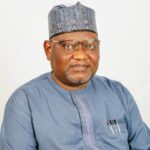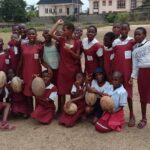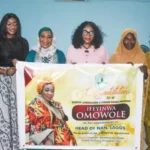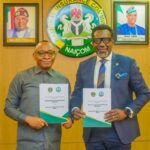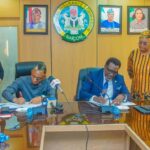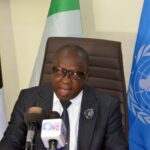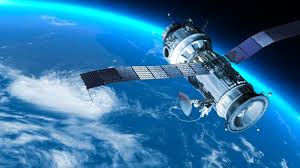By Ijeoma Olorunfemi, News Agency of Nigeria (NAN)
In Africa, since 2007, there has been a growing interest in monitoring space weather by a few regional space agencies under the aegis of United Nations Office for Outer Space Affairs (UNOOSA) and its partners.
The UNOOSA partners’ initiatives have also raised the need for infrastructure, funding and human capital development.
Some of the progress recorded so far includes the establishment of research centres, citing modelling equipment in the centres and raising of awareness about space weather’s unique impacts on the continent that lies across the equatorial region.
Space agencies such as South African National Space Agency (SANSA), the National Space Research and Development Agency (NASRDA) are among the foremost space agencies established with centres to monitor space weather.
Programmes like the Unique African Ionospheric Science, Ground-Based Observation Networks like GPS receivers, magnetometers and a Fabry-Perot interferometer were deployed by Nigeria, while an advanced modelling such as the AFriTEC Ionospheric Model is among facilities in place to monitor space weather.
For sustained capacity building and widening the scope of space weather monitoring, UNOOSA and Nigeria held a one-week workshop from Oct. 6 to Oct. 10 on the International Space Weather Initiative (ISWI).
The event was organised by Nigeria’s National Space Research and Development Agency (NASRDA).
The workshop focused on “Space Weather During a Moderate Solar Cycle 25 and had in participation over 20 countries, including France, Germany, Japan, Côte d’Ivoire, South Africa, Brazil, India and Indonesia, as well as officials from National Aeronautics and Space Administration.
Experts say space weather, during a moderate solar cycle, signifies a period of relatively low, though not minimal, solar activities.
Ms Sharafat Gadimova, UNOOSA, Austria, said developing capabilities in space weather was one of many space activities UNOOSA supported members states to achieve.
Gadimova reaffirmed the office’s commitment to strengthening Africa’s capacity in space weather observation, data sharing and satellite-based forecasting through collaborative programmes and partnerships.
She said UNOOSA, through the International Committee on Global Navigation Satellite Systems (ICG), had been supporting regional centres for space science and technology education in Africa, particularly the UN-affiliated ones in Nigeria and Morocco.
“These centres, such as the African Regional Centre for Space Science and Technology Education in English (ARCSSTE-E) in Ile-Ife, play a vital role in connecting institutions involved in Global Navigation Satellite Systems (GNSS) and space weather studies with international partners.”
According to her, the centres serve as information hubs for ICG activities and coordinate closely with GNSS providers to strengthen data exchange, technical collaboration and research capacity across Africa.
She explained that one of the major recent efforts was an international GNSS workshop jointly organised in August 2024 by ARCSSTE-E and the National Time Service Centre of the Chinese Academy of Sciences.
“It is through these workshops that African scientists and students are gaining access to new research tools, building regional expertise and fostering international partnerships.”
Gadimova said the partnerships had provided African researchers opportunities to participate in training and measurement programmes using GNSS-based observations to study ionospheric disturbances and space weather phenomena.
She said that Africa’s proximity to the magnetic equator made the region of great scientific interest but said research from the continent had been inconsistent due to lack of long-term and dependable measurements.
“Collaboration among low-latitude countries and the availability of reliable data are helping to increase GNSS awareness and support the use of technology for socio-economic and scientific development in Africa,” she said.
Ms Christine Amory, a French physicist and coordinator of the space weather training initiative, said the programme, unveiled in 2009, had expanded to 21 African countries and focuses on studies around the sun to the magnetosphere; hence, providing tools from countries including Germany and France to train African scientists and students.
Amory highlighted that the initiative had produced several high-level scientific publications and fostered strong collaboration between African, European and Asian researchers.
However, she said challenges remained in securing government support and funding for expensive scientific instruments, calling for continued international cooperation and local advocacy.
“We need to keep identifying observatories and supporting African governments to fund infrastructure for long-term measurements,” she said.
Prof. Babatunde Rabiu, a Space Physicist at NASRDA, described the ISWI as a strong global network of scientists and instruments monitoring space weather since its inception in 2009.
“The initiative now comprises over 1,000 instruments and more than 100 arrays deployed worldwide and has significantly increased Africa’s research visibility and output, strengthened international collaboration and supported the development of tools and software for monitoring space weather,’’ he said.
Rabiu said Nigeria’s participation had enabled the country to host international scientists and expand its scientific footprint in global publications.
Prof. Olivier Obrou, a space scientist from the University of Côte d’Ivoire, emphasised that Africa’s growth in space science depended on training and education.
“The key issue is training human resources. If you do not have trained scientists, you cannot manage or maintain space technology,’’ he said.
Ms Zama Katanzi-Joseph of the South African National Space Agency (SANSA) underscored the importance of space technology for societal growth, especially in communication and emergency response.
“Space weather directly affects technologies like GPS navigation and satellite communication that are critical for health services, transportation, and daily activities.”
Katanzi-Joseph called for sustained interest and investment in space research across Africa, adding that such investments contribute to solving broader developmental issues.
“Investing in space science does not take us away from solving hunger or education challenges, it supports them through innovation and data-driven solutions,” she said.
Prof. Katarina Pavlonic, a Serbian Scientist, highlighted the potential of space data for innovation across health, agriculture and finance sectors.
Pavlonic urged African governments to invest heavily in Science, Technology, Engineering, and Mathematics (STEM) education, particularly space sciences for long-term sustainability.
“Space data can drive innovation and economic growth if properly accessed and used, while emerging technologies like Artificial Intelligence and machine learning are already transforming space weather monitoring,” she said.
Similarly, Mr Filip Sklebar, a Croatian scientist, emphasised the role of advanced modelling and machine learning in improving GNSS accuracy during geomagnetic storms.
He said that Croatia, though lacking a dedicated space agency, was exploring partnerships with the European Union to strengthen research infrastructure and possibly establish one in the future.
Experts at the workshop agreed that collaboration, capacity building and consistent data collection were key to advancing Africa’s role in global space weather monitoring.
They called on African governments and developing countries to provide sustained support for education, equipment and research as space weather affects critical sectors such as aviation, defence, communication and finance.(NAN Features)
***If used, please credit the writer and the News Agency of Nigeria.

